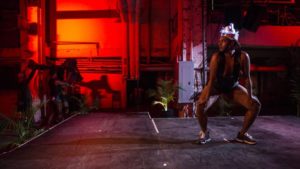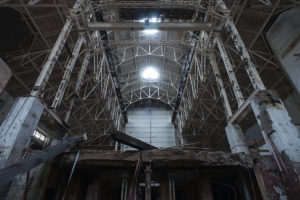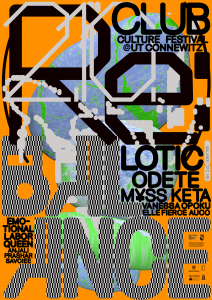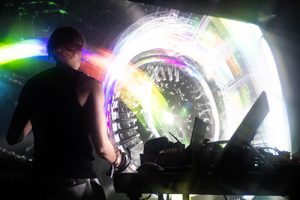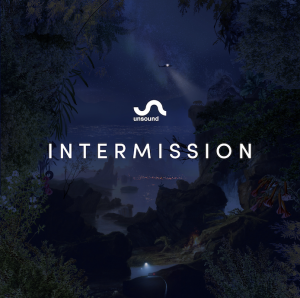Emergent sentience – a holy grail of unity between new technological developments and age-old philosophical ideas – provides a set of perspectives to consider the nature of presence. Death, legacy and the echoes of physical, mental and spiritual awareness grant further windows to gaze through. Presence is felt and shared as both personal and communal experiences. The treacherous chasm between memory and canonisation in a world currently obsessed with ‘truth’ is pertinent.

The Unsound brochure posits that this year’s theme of ‘Presence’ invites reflection on how best to exist under life’s circumstances. The international festival is known for its forays into electronic and avant-garde music and art, bringing a multidisciplinary cohort of producers, performers, musicians, artists and writers to the Polish city of Kraków to pragmatically tackle multifaceted questions on the modes, meanings and manifestations of existence. Tying global artists with local scenes, it brings the fringes to a concentrated centre each year. It sits as a towering landmark for a culture that sees itself as underground and experimental, cultivating moments of alone togetherness that are simultaneously slow-moving and epiphanic, tangible and amorphous. These contradictions are continuously negotiated just as the festival navigates its own way through its point of inquiry. Salient angles from which the concept of presence is approached include survival, absence, disruption and the digital realm. These perspectives are investigated in the sections below, alongside thoughts from some of the artists themselves.
Virtual and Digital
A number of avatars take to the stage at Unsound. Sinjin Hawke and Zora Jones have flitted between virtual and physical realms, hosting interactive videos online and bringing their own rubbery, mutative uncanny valley sonics to club music as Fractal Fantasy. For their peak set time appearance at the colossal Hotel Forum, they perform with live motion capture to project themselves in different sizes, shapes and environments on the screen behind them.
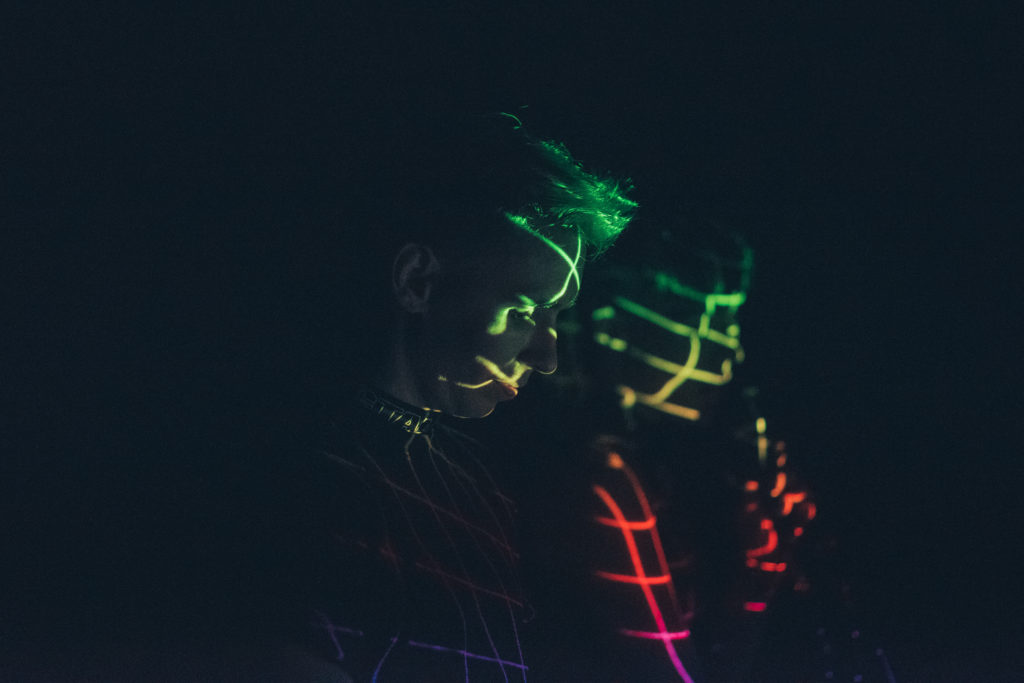
‘Absence 2018‘ is a bot developed by crypto-artist TCF and several programmers, created and deployed during the festival. Users of the Facebook Messenger chatbot can type commands, allowing them to check programme details, broadcast messages and receive notes. The scope of the user experience soon widens as the automated service begins to assign tasks to users, ranging from pop quiz questions on Unsound’s history to initiating a competitive augmented reality game with prizes. It’s a novel way to communicate with people during events and provides the opportunity to share the experience with strangers and a charming play on the theme. The choice to prioritise people’s connections with each other rather than having the bot strike up a false friendship with users comes as a relief.
The premiere of performance and audiovisual art-based presentation ‘Magna Surgat’ also features live motion capture. Dance collective House of Kenzo interpret the music of fellow Texan producer Rabit, and their choreography is in turn monitored and reconfigured into a digital environment on screen by visual artist Sam Rolfes. The visceral voguing of the dancers and the hypnotic abstractions of their shadows on screen are locked in battle for the audience’s attention. Company Wayne McGregor reverse the flow of information in the Jlin-scored Autobiography, a show where the dance ensemble move to the DNA of their namesake as parsed by an algorithm. Graceful and opaque, it’s a reminder of all an avatar can conceal in the act of appearing visible.
Play and Disruption
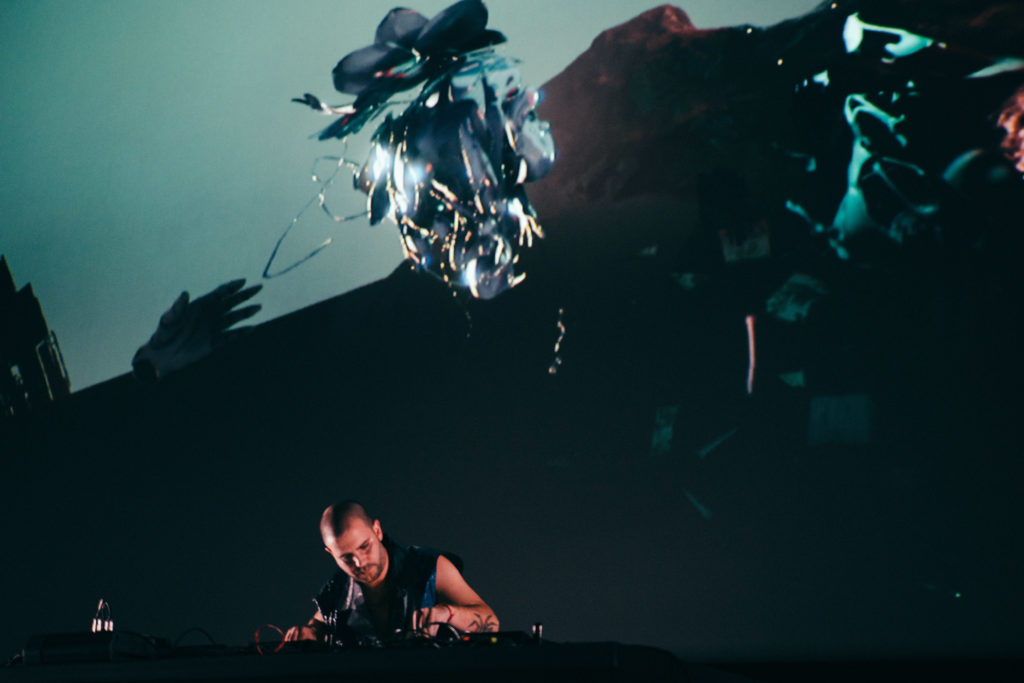
Writer and composer Emile Frankel speaks on ideas of play and ambiguity in music and their relationship with the current political climate. He posits that much of the music from recent years sitting on the industrial-electronic-experimental axis (Amnesia Scanner’s work, for example) feature a sense of compositional uncertainty and randomness. This taps into human tendencies of extracting information from noise and discerning patterns where there are none – a sensation known as apophenia. In the act of listening, this compositional ambiguity compels people to subconsciously long for stability and meaning in the music. Frankel then introduces the phenomenon of collective false memory known as the ‘Mandela effect’, where social factors such as ambiguous information lead people to believe untruths (i.e. that Nelson Mandela died in the 1980s – a falsehood many have subconsciously embraced). When their illusions are shattered, those experiencing the effect come to believe something is amiss with reality itself, rather than accept that they’d misremembered. A similar expression of existential denial has become quite common since Donald Trump’s inauguration as US president. Frankel says the Mandela Effect is an unintended political consequence of ambiguity, almost issuing a caution to the dystopian, erratic electronic sound of the moment. Fortunately, he proposes that there is a utopian, constructive way to introduce ambiguity into music: through play. He nods to improv jazz, more of an approach than a genre; it sets its own paradigms and seeks to discover rather than obfuscate, just as children do.
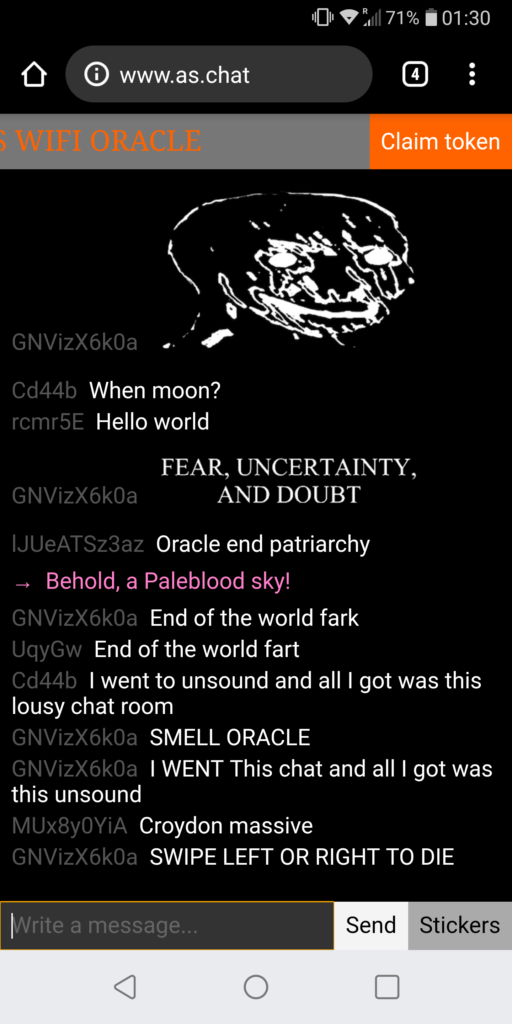
Amnesia Scanner’s recent album Another Life features the voice of Oracle, a software stack processing outsourced vocal work from online freelance marketplace Fiverr, manifesting as the third member of the group. The ‘AS Oracle’ live show introduces this new member across media, as the crowd is invited to join an ad hoc Wi-Fi network with a dedicated chatroom where Oracle is also present during the concert. Usernames are anonymised and anyone in the IM chatroom can share words or Amnesia Scanner-themed stickers, while the ‘chatbot’ Oracle also weighs in. The user base of fans incline the conversation towards self-referential memes, in-jokes, commentary on the music and frequent, transgressive attempts to test the limits of the technosocial construction. Oracle’s responses are in essence a simulation of the Turing test, while the encouragement to look down and stare at one’s phone during Amnesia Scanner’s performance flies in the face of live music convention and adds a new dimension to being present. The group take this idea one step further, triggering the webpage’s background to flash oranges and yellows during particularly intense moments of the music. Through logging in and participating in the chat, the audience inadvertently become proxy strobes for the artists, their phones now lighting fixtures to be weaponised at whim.
Elements of disruption and chaos are intentionally programmed, too – percussionist Adam Gołebiewski launches into his powerful solo drum set smack in the middle of a club night crowd, moments after the previous act has left the stage. At other times, artists themselves take the initiative. Gaika ensures that the audience is part of his bombastic, industrial-drenched dancehall storytelling. He tells the lighting engineer to bring the room to total darkness before asking his audience to turn their phone flashlights on. While such a request is often saved for more still, sentimental gig moments, here the vibrancy and sway of the dancers and their torches conjures a more spirited, ritualised unity.
Gaika Speaks
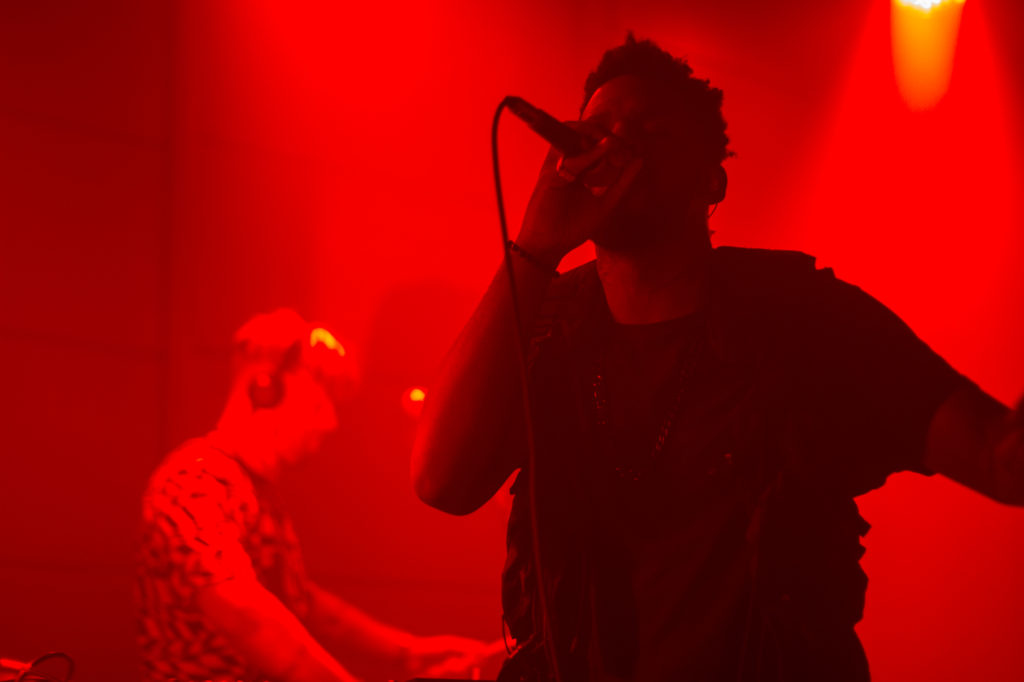
On his stories: “They’re from all around the world and it’s all true. It’s actually my life. If you know anything about me and you go and listen to the lyrics, it’s quite uneasy listening. It’s quite an uneasy listen for a lot of my friends – they get it, they know what it’s all about.”
On technology: “I didn’t have a phone for four years. They just rot your mind, you know? Well not rot your mind but make you not present. You have to wean yourself off it, so you don’t have to pick up and put it down. I use Instagram less than most people but I see it as unnatural to me. If it gets too much I’ll throw my phone in the bin, because I think we’re sliding between realities.”
On staying present: “Concentrate on what’s real, on what has meaning. Not the spectacle, the actual thing. How I feel, [how I’m] being viewed. Not how I want to feel, not how I want to be viewed.”
Absence and Isolation
A classical concert pays tribute to esteemed composer Jóhann Jóhannsson by way of his previous collaborators: Hildur Guðnadóttir, Sam Slater, Erik K. Skodvin, Robert Aiki Aubrey Lowe and Sinfonietta Cracovia, who close Unsound on a gentle, comforting note. The festival also remembers and celebrates Ursula K. Le Guin, through a poignant, enthralling performance of her project with Todd Barton, Music and Poetry of the Kesh. It is presented as the sound of a fictional, purely imagined society, isolated from real life frames of reference. Yet the vaguest recognition of familiar textures and melodies prompts a consideration of all we passively absorb from our surroundings. Anthropological studies continue in the film programme, as Welcome to Sodom (2018) spotlights Agbogbloshie, Accra – the destination landfill for swathes of the West’s electronic waste. Through an inescapably colonial aperture, the film intrudes upon and documents a troubled community of workers left damned by consumerism, delving into what it means to be isolated and ignored in a globalised world.
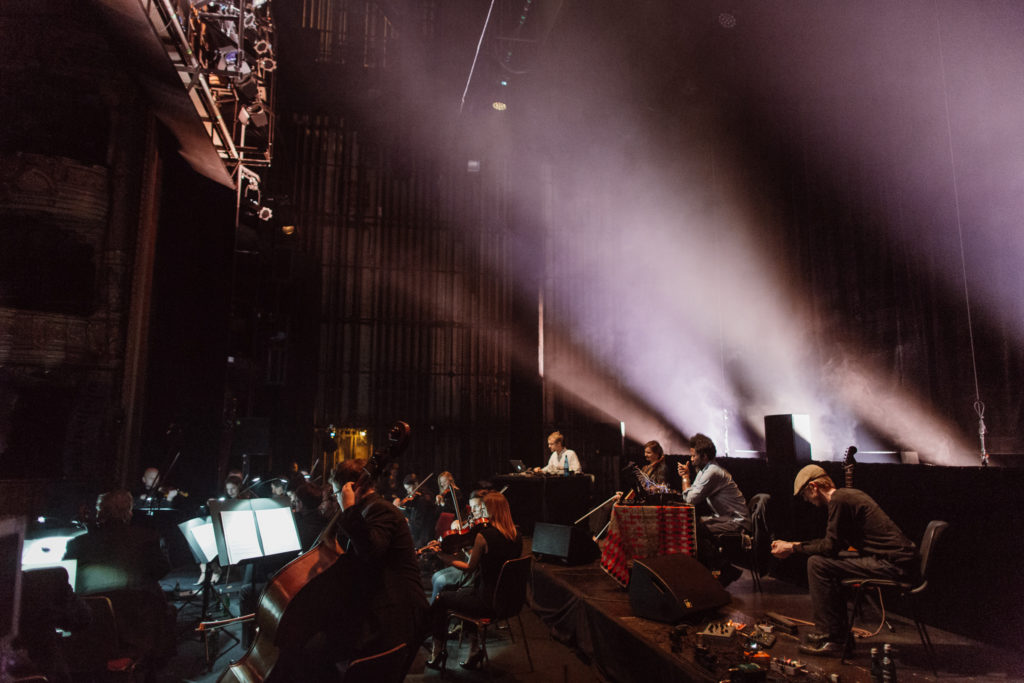
A train ride outside of Kraków and down a skeletal, draughty lift underground lies the Wieliczka Salt Mine. It exists in the forced, shallow liminal space between abandonment and community as tourist attractions often do, offering a canteen, bar and remarkably strong 4G connection among its cavernous walkways and curious chapels. It’s here that minimalist vanguard Terry Riley performs with his son Gyan to a seated audience who are entombed in the stasis of quiet music amidst silent surroundings. Terry Riley’s brittle voice contends with the anatomical demands of his opening raga, his Hindi developing Arab inflections alongside Gyan’s acoustic guitar as if the pair were making Malian folk. Here in the Polish mines, with the Rileys on stage – for how many is this the first time seeing Indian classical music live?
Survival and Sustenance
Rory Gibb, Paul Rekret and Anja Kanngieser broach the topic of sound and environmental crisis in their presentation called ‘Amplification/Annihilation’. They draw a parallel between the growing use of field recordings in countercultural spheres and the ecologies of ‘60s and ‘70s folk revival music, such as Joni Mitchell’s ‘Big Yellow Taxi’. The causes and consequences of climate change are not equally distributed across the globe, so it is interesting then that the researchers point out the most diligent sonic activism in this area has come from marginalised communities. They cite Standing Rock protest group Voices of Water, as well as a bounce anthem from New Orleans’ 5th Ward Weebie titled ‘Fuck Katrina’. While the electronic underground’s apocalyptic rave music thrills in its own way, this sort of activism makes a compelling argument for moving beyond fetishising sonic aesthetics and using music to galvanise and mobilise instead. In a similar vein of protest, free jazz group Irreversible Entanglements marry mesmerising musicianship with uncompromising resistance politics to devastating effect. “Why are you here? Who sent you?” Moor Mother demands, leading the band. For some, simply being at Unsound in Kraków – a scene and city largely white – is an act of resistance and a declaration of the right to exist and be present in itself. Lotic’s lyrics also resonate with this issue of making presence felt: “May every step you take burn your print.”
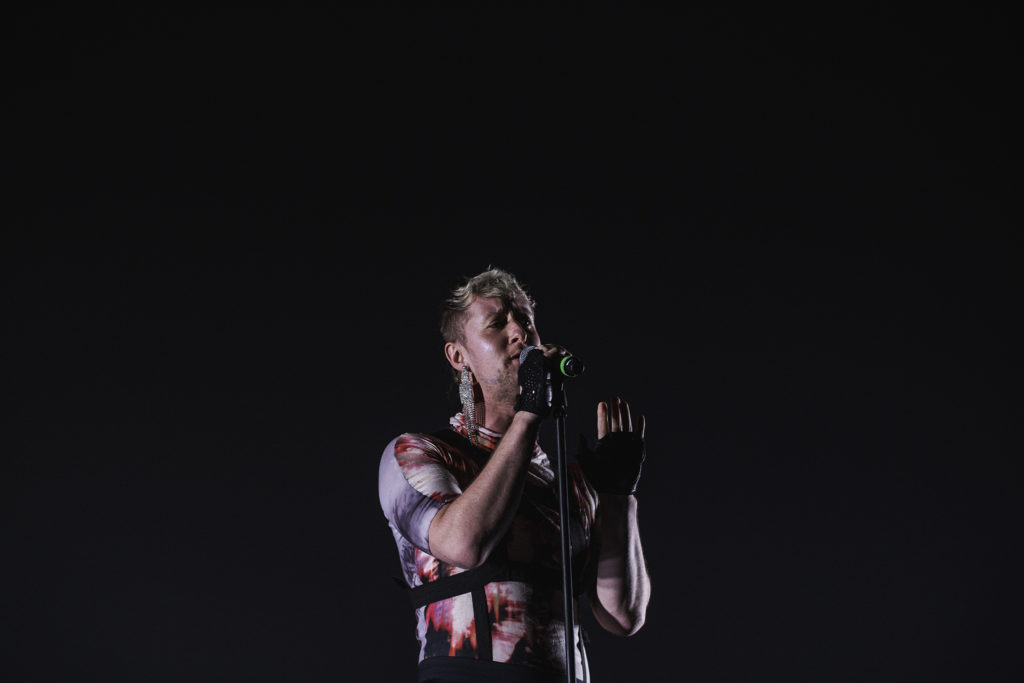
Sarah Davachi’s midweek morning show demonstrates music’s healing potential as she shares delicate ambient tones to an audience strewn across the floor. Care is also a key theme of vocal and performance artist Colin Self’s opera Siblings. Backed by a string section and a choir of workshop participants formed earlier in the week, Self presents a proposal for interdependency, non-biological/found families and queer kinship through cluttered electronic beats and Disney-like expositional ballads. Concepts such as ‘reflection’ and ‘radical dissolving’ appear on a screen with track titles and a timer counting down to the end of each song. Self frequently breaks the fourth wall to narrate their own performance, leaping on and off the stage, sitting with the choir on the floor at times and sending off the show with a climactic vogue routine. They pose with venue staff, clamber in amongst audience seating to cause havoc and wave a book tied to a string as a prop, steadily tearing it apart. It’s a joyous, bemusing and righteous affair that champions ideas of presence through and through.
Colin Self Speaks
“If you’re doing performance, presence is always part of the conversation. I was leading this choir session yesterday and one of the people participating [was] talking about presence not just being about what the performer is doing but actually the other people in the room. Getting out of this very vertical, binary relationship of audience performer, where everyone else also has to be present. So much of what these choir sessions became is trying to get us to be present with each other, and presence also being about active listening and engaging with each other on a human body energy level.”
“I think people are checked out because it’s a really hard time to be alive, in some ways. People are increasingly taken out of these places where we can encounter a stranger and have a relationship with a stranger in conversation. Presence is… I feel it’s precarious because it’s under attack. Being with each other is something we have less and less of. There’s solitary presence which has to do with a meditative state, in yourself and conscious of yourself. But then there’s presence with multiple people in the room, are you paying attention to what’s happening and what’s going on to what’s around you?”**
